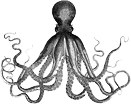• tentacular •
Pronunciation: tin-tæ-kyê-lêr • Hear it!
Part of Speech: Adjective
Meaning: 1. Resembling a tentacle. 2. Having tentacles. 3. Strong at grasping, as 'a tentacular grip'. 4. Having multiple activities or agencies, or branches as 'a tentacular corporation'.
Notes: Today's Good Word is an uncommon metaphorical usage of a regular adjective. Tentacular is, of course, the adjective for tentacle, so should mean "related to tentacle or tentacles". It does that, but the idea of many grasping arms is a metaphorical temptation that writers at The Economist could not resist.
In Play:  Here is the line today's contributor found in The Economist, "Trump and Russia, the never-ending story", April 1, 2017: "Russian power is slippery and tentacular, often operating through businessmen instead of officials." Empires are often tentacular: "Rupert Murdoch's tentacular publishing empire tends to be conservative in philosophy.
Here is the line today's contributor found in The Economist, "Trump and Russia, the never-ending story", April 1, 2017: "Russian power is slippery and tentacular, often operating through businessmen instead of officials." Empires are often tentacular: "Rupert Murdoch's tentacular publishing empire tends to be conservative in philosophy.
Word History: Our word today comes from Modern Latin tentaculum, literally "little feeler," from Latin tentare "to feel, try" + -culum, a diminutive suffix. Tentare is a variant of temtare, temptare "to handle, touch, feel, test, try", which devolved into Portuguese and Spanish tentar "to tempt", Italian tentare, which corresponds to English tempt, which came from the same source. Tentativus, whence English tentative, is based on the past participle of tentare. Nothing is known about the history of the Latin word. (So, now let's thank George Kovac, whose tentacular mind caught today's new usage of a spectacular Good Word in The Economist.)
P.S. - Register for the Daily Good Word E-Mail! - You can get our daily Good Word sent directly to you via e-mail in either HTML or Text format. Go to our Registration Page to sign up today!




